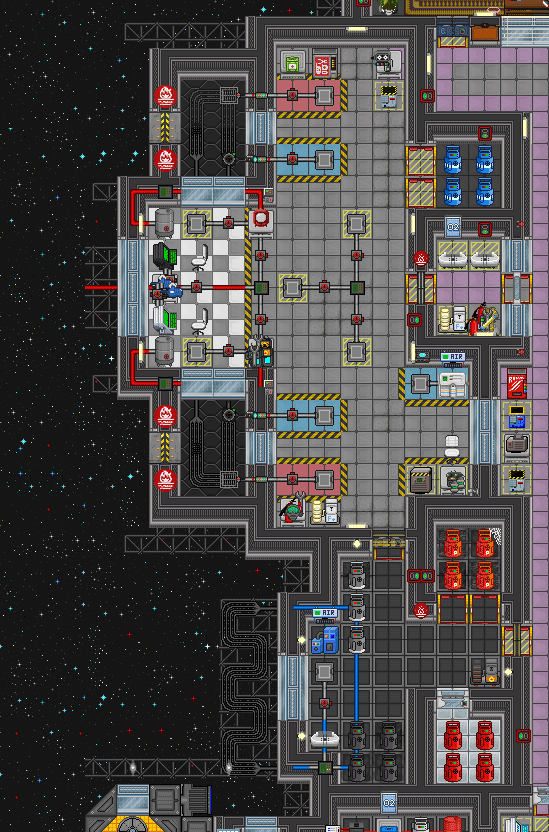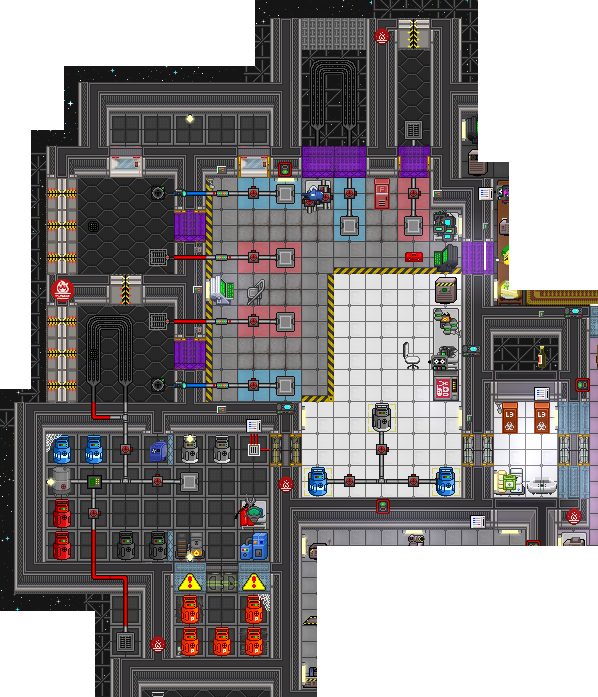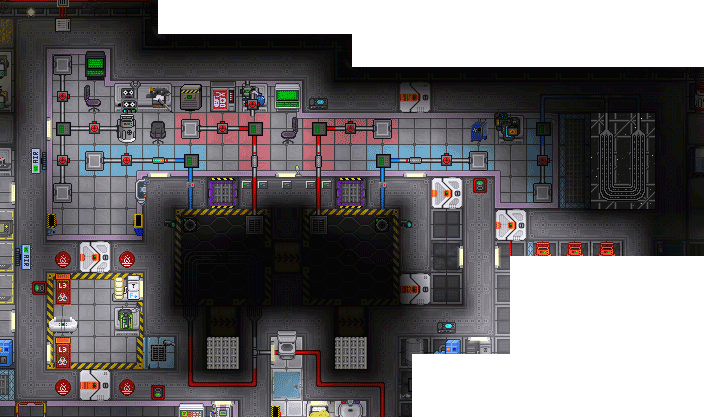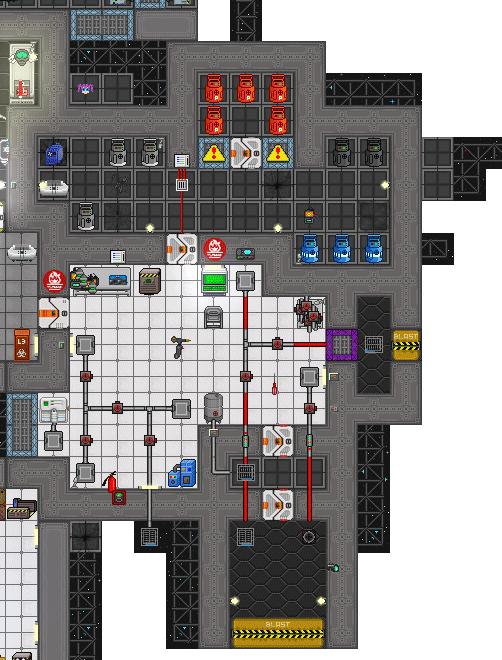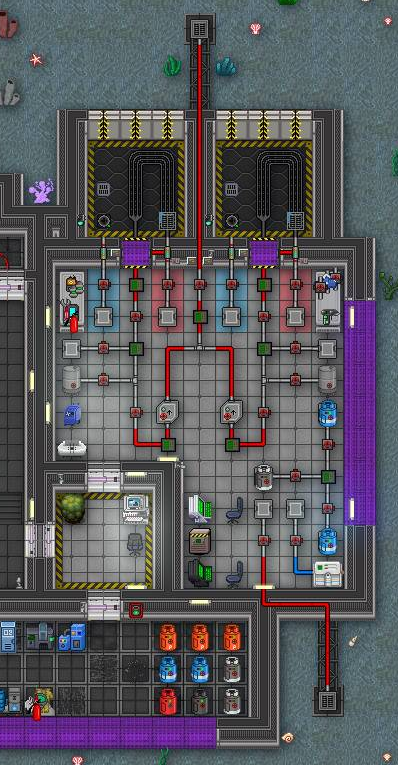User:Studenterhue/Sandbox
| Name | Type | Materials Required | Hidden/Secret item? |
Time Required at Speed 3 (Seconds) |
|---|---|---|---|---|
| Screwdriver | Tool | 1 Metal | ✗ | 1 Second |
| Wirecutters | Tool | 1 Metal | ✗ | 1 Second |
| Wrench | Tool | 1 Metal | ✗ | 1 Second |
| Crowbar | Tool | 1 Metal | ✗ | 1 Second |
| Fire Extinguisher | Tool | 1 Sturdy Metal, 1 Crystal | ✗ | 2 Seconds |
| Welding Tool | Tool | 1 Sturdy Metal, 1 Conductive Material | ✗ | 2 Seconds |
| Soldering Iron | Tool | 1 Sturdy Metal, 1 Conductive Material | ✗ | 2 Seconds |
| Flashlight | Tool | 1 Metal, 1 Conductive Material, 1 Crystal | ✗ | 1 Seconds |
| Welder Mask | Clothing | 2 Sturdy Metal, 2 Crystal | ✗ | 3 Seconds |
| Multi Tool | Tool | 1 Crystal, 1 Conductive Material | ✗ | 2 Seconds |
| Metal Sheet | Resource | 1 Metal | ✗ | 0 Seconds |
| Reinforced Metal | Resource | 2 Metal | ✗ | 4 Seconds |
| Glass Panel (x5) | Resource | 5 Crystal | ✗ | 2 Seconds |
| Reinforced Glass Panel | Resource | 1 Crystal, 1 Sturdy Metal | ✗ | 4 Seconds |
| Portable Gas Canister | Machinery | 3 Sturdy Metal | ✗ | 3 Seconds |
| Circuit Board | Component | 2 Conductive Material | ✗ | 1 Second |
| Electrical Cable Coil (28 lengths) | Resource | 10 Insulative Material, 10 Conductive Material | ✗ | 1 Seconds |
| Power Cell (15k capacity) | Component | 4 Metal, 4 Conductive Material, 4 Any Material | ✗ | 10 Seconds |
| Erebite Power Cell (15k capacity) | Component | 4 Metal, 4 Any Material, 2 Erebite | ✗ | 15 Seconds |
| Cerenkite Power Cell (15k capacity) | Component | 4 Metal, 4 Any Material, 2 Cerenkite | ✗ | 15 Seconds |
| Light Bulb Box (7x standard, white light light bulbs) | Resource | 1 Crystal | ✗ | 1 Seconds |
| Red Light Bulb Box (7x red light bulbs) | Resource | 1 Crystal, 1 Conductive Material | ✗ | 2 Seconds |
| Yellow Light Bulb Box (7x yellow light bulbs) | Resource | 1 Crystal, 1 Conductive Material | ✗ | 2 Seconds |
| Green Light Bulb Box (7x green light bulbs) | Resource | 1 Crystal, 1 Conductive Material | ✗ | 2 Seconds |
| Cyan Light Bulb Box (7x cyan light bulbs) | Resource | 1 Crystal, 1 Conductive Material | ✗ | 2 Seconds |
| Blue Light Bulb Box (7x blue light bulbs) | Resource | 1 Crystal, 1 Conductive Material | ✗ | 2 Seconds |
| Purple Light Bulb Box (7x purple light bulbs) | Resource | 1 Crystal, 1 Conductive Material | ✗ | 2 Seconds |
| Blacklight Bulb Box (7x UV light bulbs) | Resource | 1 Crystal, 1 Conductive Material | ✗ | 2 Seconds |
| Light Tube Box (7x standard, white light light tubes) | Resource | 1 Crystal | ✗ | 1 Seconds |
| Red Light Tube Box (7x red light tubes) | Resource | 1 Crystal, 1 Conductive Material | ✗ | 2 Seconds |
| Yellow Light Tube Box (7x yellow light tubes) | Resource | 1 Crystal, 1 Conductive Material | ✗ | 2 Seconds |
| Green Light Tube Box (7x green light tubes) | Resource | 1 Crystal, 1 Conductive Material | ✗ | 2 Seconds |
| Cyan Light Tube Box (7x cyan light tubes) | Resource | 1 Crystal, 1 Conductive Material | ✗ | 2 Seconds |
| Blue Light Tube Box (7x blue light tubes) | Resource | 1 Crystal, 1 Conductive Material | ✗ | 2 Seconds |
| Purple Light Tube Box (7x purple light tubes) | Resource | 1 Crystal, 1 Conductive Material | ✗ | 2 Seconds |
| Blacklight Tube Box (7x UV light tubes) | Resource | 1 Crystal, 1 Conductive Material | ✗ | 2 Seconds |
| Grey Jumpsuit | Clothing | 4 Fabric | ✗ | 1 Seconds |
| Black Shoes | Clothing | 3 Fabric | ✗ | 1 Seconds |
| Breath Mask | Clothing | 1 Fabric | ✗ | 1 Seconds |
| Chemical Patch (no chems) | Resource | 1 Fabric | ✗ | 1 Seconds |
| Compressed Matter Cartridge | Resource | 5 High Density Crystalline Material | ✓ | 3 Seconds |
| Large Compressed Matter Cartridge | Resource | 45 High Density Crystalline Material | ✓ | 10 Seconds |
| Glass Bottle (empty) | Miscellaneous | 1 Crystal | ✓ | 1 Seconds |
| Vuvuzela | Miscellaneous | 1 Any Material | ✓ | 1 Seconds |
| Harmonica | Miscellaneous | 1 Metal | ✓ | 1 Seconds |
| Bicycle Horn | Miscellaneous | 1 Any Material | ✓ | 1 Seconds |
| .38 Stunner Rounds | Resource | 3 Metal, 2 Conductive Material, 2 Crystal | ✓ | 6 Seconds |
| .22 Bullets | Resource | 30 Sturdy Metal, 24 Conductive Material | ✓ | 10 Seconds |
| 40mm Smoke Grenade | Resource | 30 Sturdy Metal, 25 Conductive Material | ✓ | 11 Seconds |
| Staple Gun | Tool | 2 Sturdy Metal, 1 Conductive Material | ✓ | 3 Seconds |
Plasma Research (generally known as Toxins) is where scientists intricately study the properties and capabilities of plasma. They do this by superheating plasma and using it to build bombs capable of ripping giant hull breaches into the station and killing everyone. Or, they might just cause an uncontrollable plasma fire in the escape arm or release super-heated carbon dioxide in the hallways, frying people from within. Generally only bad things happen in toxins, which is what makes it such a beloved part of the station.
| Don't test your bombs on the station itself unless you are a legit antagonist. |
|---|
General Practice
To connect a canister to a connector, simply drag it on top of the connector, then wrench it to connect. The gas will automatically start to flow through the pipes. The gas will proceed unless the valve is turned closed (red). The pipes into the combustion chambers are special--some are strictly outtake (gas will only flow towards the mixing room), and some are strictly intake (air will only flow out of the mixing room). More on them later.
To check out the contents of your canisters, use your scientist PDA's built in scanner on it. It will give you a summary of its total pressure, its contents by percentage, and its temperature.
Mixing
The T-shaped section of piping with three ports and valves in the rough center of the lab is for mixing gases together.
The T-shaped section of piping with three ports and valves just by the entrance is for mixing gases together.
The T-shaped section of piping with three ports and valves in the far left is for mixing gases together.
The T-shaped section of piping with three ports and valves in the middle is for mixing gases together.
The T-shaped section of piping with three ports and valves in the bottom right by the cooler is for mixing gases together.
The T-shaped section of piping with three ports and valves in the far left is for mixing gases together.
When you connect canisters to the ports and open the valves, the gases will mix together and equalize among all the containers, depending on the number of canisters and the proportions of gases. Mixing follows a consistent, somewhat sensible pattern, but it takes a while to learn.
For example, if you connect a canister of 100% oxygen and a canister of 100% plasma to two ports and open their valves, each canister will be 50% plasma and 50% oxygen. If you remove one canister and add a 100% plasma canister, the two canisters would have 75% plasma and 25% oxygen.
However, if, instead removing you then connect a canister of plasma to the third port and turn its associated valve, all three canisters would be 66% plasma and 33% oxygen. You would get a similar result if you originally had connected two canisters of plasma and one canister of oxygen and opened all their valves at the same time.
Heating
The combustion chambers is/are vacuum sealed room(s) where gas can be piped in, then ignited with a spark by pressing the igniter switch. The resulting hot mixture of gas can be pumped out of the chamber and into empty canisters through the adjacent outlet valves or used to heat whatever gases were feed into the chamber pipes. If the gas is a dud or the experimenting is finished, it can also be vented into space via the Combustion Vent switch.
Cooling
Disposal
Storage & Other
The storage room contains air scrubbers, a tank dispenser, and canisters of various types of gases, most notably, plasma and oxygen.
To test your bombs, use the special simulator equipment (for transfer valve bombs) or alternatively blow up something in the debris field.
How not to die horribly
- Always wear internals.
- Don't open any of the canisters, unless there is a tank attached.
- Do not leave any lit welders around.
- Move any welding fuel tanks out of the lab.
- Don't open a valve if you don't know what it'll do.
- If it looks like gas is leaking, use the air scrubber immediately.
